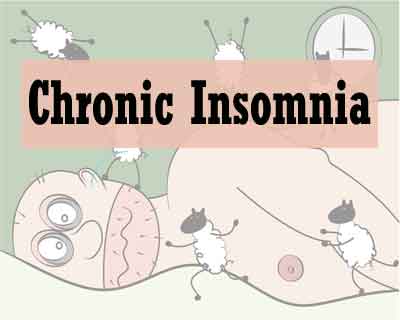- Home
- Editorial
- News
- Practice Guidelines
- Anesthesiology Guidelines
- Cancer Guidelines
- Cardiac Sciences Guidelines
- Critical Care Guidelines
- Dentistry Guidelines
- Dermatology Guidelines
- Diabetes and Endo Guidelines
- Diagnostics Guidelines
- ENT Guidelines
- Featured Practice Guidelines
- Gastroenterology Guidelines
- Geriatrics Guidelines
- Medicine Guidelines
- Nephrology Guidelines
- Neurosciences Guidelines
- Obs and Gynae Guidelines
- Ophthalmology Guidelines
- Orthopaedics Guidelines
- Paediatrics Guidelines
- Psychiatry Guidelines
- Pulmonology Guidelines
- Radiology Guidelines
- Surgery Guidelines
- Urology Guidelines
ACP Recommendations for Initial Treatment of Chronic Insomnia

Philadelphia : Cognitive behavioral therapy for insomnia (CBT-I) should be the first-line treatment for adults with chronic insomnia, the American College of Physicians (ACP) recommends in a new evidence-based clinical practice guideline published in Annals of Internal Medicine.
"Cognitive behavioral therapy for insomnia is an effective treatment and can be initiated in a primary care setting," said ACP President Wayne J. Riley, MD, MPH, MBA, MACP. "Although we have insufficient evidence to directly compare CBT-I and drug treatment, CBT-I is likely to have fewer harms. Sleep medications can be associated with serious adverse effects."
CBT-I consists of a combination of treatments that include cognitive therapy around sleep, behavioral interventions such as sleep restriction and stimulus control, and education such as sleep hygiene (habits for a good night's sleep). Cognitive behavioral therapy can be conducted through individual or group therapy sessions, telephone or web-based modules, and/or self-help books.
If CBT-I alone is unsuccessful, ACP recommends that doctors use a shared-decision making approach with their patients to decide whether drug therapy should be added to treatment. This should include discussing the benefits, harms, and costs of medications.
The FDA has approved medications for short-term use (four to five weeks) and patients should not continue taking them for extended periods of time. FDA labeling also states that patients with insomnia that does not remit within seven to 10 days of treatment should be re-evaluated.
"Medications should ideally be used for no longer than four to five weeks while the skills learned in CBT-I can manage insomnia over the longer term," Dr. Riley said. "Before continuing drug therapy, doctors should consider treatable secondary causes of insomnia such as depression, pain, enlarged prostate, substance abuse disorders, and other sleep disorders like sleep apnea and restless legs syndrome."
Insomnia is a major health care problem in the United States. It can occur independently or can be caused by another disease. Approximately 6 to 10 percent of adults have insomnia that meets diagnostic criteria. Insomnia is more common in women and older adults. People with insomnia often experience fatigue, poor cognitive function, mood disturbance, and distress or interference with personal functioning. Chronic insomnia is diagnosed when symptoms cause clinically significant functional distress or impairment, are present for at least three nights per week for at least three months, and are not linked to other sleep, medical, or mental disorders.
ACP developed the guideline to present the evidence and provide clinical recommendations on the management of chronic insomnia disorder in adults. Evaluated outcomes included global outcomes assessed by questionnaire, patient-reported sleep outcomes, and harms. ACP's recommendations are based on two background evidence review papers and an evidence review sponsored by the Agency for Healthcare Research and Quality (AHRQ).

Disclaimer: This site is primarily intended for healthcare professionals. Any content/information on this website does not replace the advice of medical and/or health professionals and should not be construed as medical/diagnostic advice/endorsement or prescription. Use of this site is subject to our terms of use, privacy policy, advertisement policy. © 2020 Minerva Medical Treatment Pvt Ltd